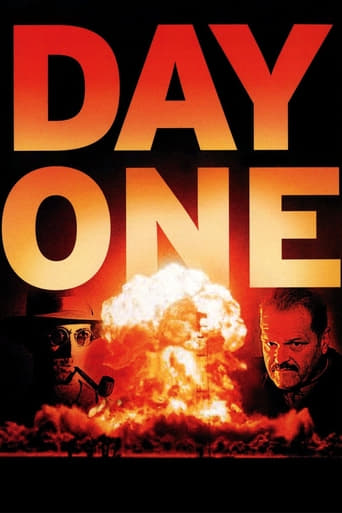

This is a very good film on the Manhattan Project, the building of the atomic bomb. It is especially a faithful adaptation of the book, DAY ONE, by Peter Wyden. Other reviews here have done a good job of description--I will add that it is far superior to the Paul Newman film on the same topic: FAT MAN AND LITTLE BOY.In addition, this film is a good teaching tool. I used to show clips from the movie to my U.S. History classes, particularly the latter portion of the film where multiple viewpoints are given of the reasons for and against the dropping of the bomb, whether or not it was necessary, and what would be the moral consequences if such a weapon was used. These viewpoints, from the military and civilian leaders in Washington and at Los Alamos, are not conjured up from the mind of some scriptwriter--they are historically accurate.
... View MoreI am usually suspicious of docudramas, but from the books I have read and the documentaries I have seen on the topic of the making of the atomic bomb, I would say that this movie does not veer too far from the truth. There is very little of "certain events have been changed for dramatic effect." In reading histories you often get bogged down in details and do not have clear visual images of the people or environments, and documentaries usually try to piece together fragments of interviews and archival footage. I found that this movie was able to supply a coherent narrative while presenting the major players and events. No fancy cinematic effects, just straightforward story telling. It's a major undertaking to tell this story and this is a quality production.I thought the choice of actors was quite good. Brian Dennehy makes a good general Groves and Michael Tucker is almost a dead ringer for Leo Szilard. Of course there is only one Oppenheimer, but I thought David Strathairn does a good impersonation. They kind of went overboard on Einstein's hair, that wig must have weighed several pounds.It probably helps to have a little background on the topic before seeing this, since there are a lot of players. The whole effort had a cast of thousands, and this movie has a cast of several dozen. One thing I thought could have been better was an easier identification of the initial appearances of various people, maybe even subtitles. For example, Patrick Breen is listed as playing Richard Feynman, but I missed catching his appearance even though I was looking for him.I thought the movie was particularly good in presenting the back-room discussions about the decision to drop the bombs. That will be debated for all time I am sure, but you come away from this thinking that it was a mistake. In that you would be in agreement with Generals Eisenhower and Marshall as well as Truman's Chief of Staff Admiral Leahy. Were over 200,000 people sacrificed in order to make a statement to the Russians or to prevent their taking a part of Japan? How many U.S. lives were saved by the bombings? Once there was the bomb, was it inevitable that it be used? Could not a demonstration have been scheduled? And so on.For a complete history the book, "The Making of the Atomic Bomb," by Richard Rhodes is good. I found the 1981 documentary, "The Day After Trinity," to be excellent. It has archival footage, but most importantly it has interviews with many of the major players. I think this movie makes a sincere attempt to tell the story, within the limitations of a normal movie run-time, of one of the defining events in the history of mankind.
... View More"Day One" feels like a portrait of the longest pre-meditated murder in the history of mankind. There are the killers, the unwitting accomplices, and the witnesses. It's all so well-documented, so perfectly arranged. This is the coldest kind of tale imaginable. Given the opportunity to put a distance of emotion and miles between the countless innocent dead and some perceived military victory, a country at large was deceived into believing that some great good or justice was being served.In spite of how you or I might see the results of the design, construction and eventual detonation of the first nuclear devices, this film doesn't take sides. Brian Dennehy and David Strathairn (two of my favorite actors) create incredibly believable characters. Michael Tucker, who looks very much like Leo Szilard, is excellent as well. I enjoyed Joseph Sargent's directorial work, a sort of off-hand realist quality he brings to nearly all his films. It serves the story well. "Day One" is a good film, just not the most engaging or tightly woven one. Your interest should depend directly on your familiarity with the subject matter.
... View MoreThis is the best of the atomic-bomb movies, and unfortunately still only available in VHS. Dennehy's performance as General Groves and Strathairn (of Good Night and Good Luck) does an amazing job as Oppenheimer. The characterizations are not the usual Hollywood clichés of professional people and their behavior. Real scientists and generals do not stop to have melodramatic arguments with stilted language, as in "Fat Man and Little Boy".It is also just an excellent job of portraying the history and science, but still remains a gripping human drama. We see the origins of the project in Europe, getting Einstein to write to the president, the issue of Soviet spies and Germany's failed efforts are described accurately, and the technical issues in building the bomb are accurate and interesting.
... View More